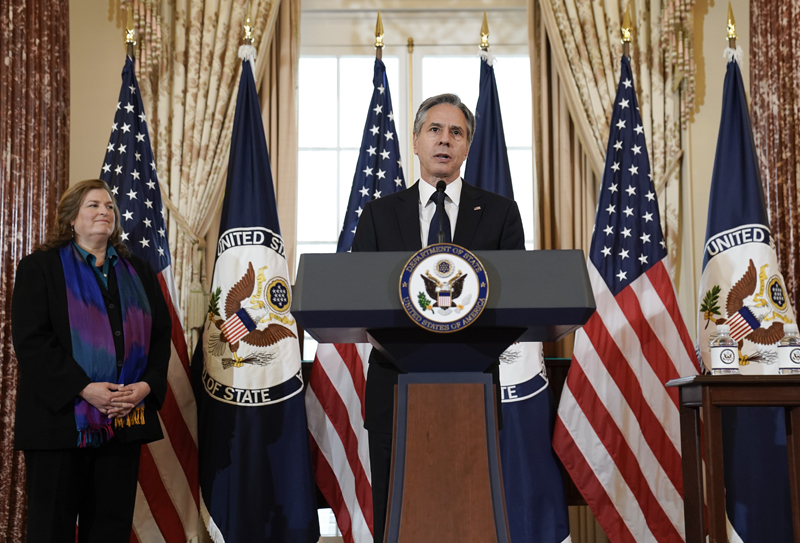 WASHINGTON: Kari Johnstone, acting director of the Office to Monitor and Combat Trafficking in Persons, listens as US Secretary of State Antony Blinken delivers remarks on the release of the 2021 Trafficking in Persons (TIP) Report at the State Department in Washington, DC on Thursday. - AFP
WASHINGTON: Kari Johnstone, acting director of the Office to Monitor and Combat Trafficking in Persons, listens as US Secretary of State Antony Blinken delivers remarks on the release of the 2021 Trafficking in Persons (TIP) Report at the State Department in Washington, DC on Thursday. - AFP
KUWAIT: The 2021 Trafficking in Persons Report found that Kuwait held to its Tier 2 rankings and continues to make progress. The government demonstrated overall increasing efforts compared to the previous reporting period, according to the report released by the US Department of State.
US Secretary of State Anthony Blinken had unveiled the 2021 Trafficking in Persons (TIP) Report on Thursday at the United States Department of State in Washington, DC. The report is an annual publication documenting the efforts of the governments of 187 countries and territories, including the United States, to combat human trafficking.
"For over 20 years, the Trafficking in Persons Report has demonstrated the United States' conviction that human trafficking is a global threat necessitating a global response," said US Ambassador to Kuwait Alina L Romanowski. "Human trafficking undermines the rule of law, robs millions of their dignity and freedom, and threatens public safety and national security everywhere," she added.
"The report is the world's most comprehensive resource of governmental anti-trafficking efforts," Ambassador Romanowski said. "It reflects the US Government's commitment to global leadership on this key human rights and law enforcement issue. The US was ranked for the first time in the TIP Report in 2010, a decision taken to ensure our policies live up to our ideals."
The report's standards are set by the US Trafficking Victims Protection Act (TVPA) and the UN Protocol to Prevent, Suppress and Punish Trafficking in Persons Especially Women and Children (also known as the 'Palermo Protocol'). "It is our sincere desire to partner with the government and the people of Kuwait to ensure that trafficking victims are cared for and perpetrators are brought to justice," Ambassador Romanowski said.
Some of the Government of Kuwait's efforts to meet the minimum standards as outlined in the report include the continued use of a specialized trafficking unit to investigate potential trafficking crimes and increase prosecutions and convictions under the anti-trafficking law. The government also provided shelter and protection services to victims of trafficking and executed new policies to protect workers vulnerable to trafficking.
While the report documents progress, it also highlights several key areas for improvement. It found that the government did not regularly use standard procedures for proactively identifying victims and referring them for protection services, and continued to detain, prosecute, and deport trafficking victims, including those fleeing forced labor. Also, some officials continued to routinely use arbitration and administrative penalties to resolve grievances filed by domestic and other migrant workers instead of investigating such cases as human trafficking crimes.
.jpg)
